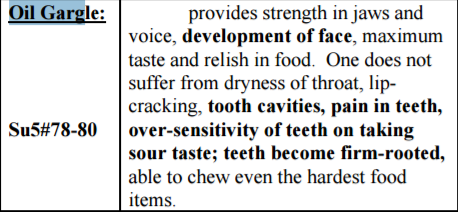What You Need to Know About Oil Pulling
By:
Like most trendy natural remedies, the popular oral hygiene technique called "oil pulling" comes with a host of myths about what it actually does.
Its proponents pitch the swishing and sucking of oil as everything from an ancient method of improving oral health to a way to detoxify the body and cure deadly diseases.
Meanwhile, skeptics see it as a marginally effective oral treatment, but nothing else. Even so, proponents swear that "it just works" for them.
Oil pulling is said to have originated in the ancient Ayurvedic Indian natural medicine text "Charaka Samhita," according to a piece from Jezebel. A translation of the text by yoga guru Gabriel Van Loon describes "oil gargling" as one element of a "daily routine" that provides "strength in jaws and voice, development of face, maximum taste and relish in food." The ancient text also claims it will prevent "dryness of throat, lipcracking, tooth cavities, pain in teeth, [and] over-sensitivity of teeth."
 Gabriel Van Loon - barnesandnoble.com
Gabriel Van Loon - barnesandnoble.com
The modern version is notably different. As described on various health websites, including prominent nutritionist Dr. Josh Axe, you suck, swirl, and swoosh oil, such as coconut or sesame, for 10-20 minutes, spit out the cloudy oil, and rinse with sea salt water. This is meant to be done either in concert with or instead of regular tooth brushing.
The result, according to supporters like Axe, popular health blog Wellness Mama, and others, is strengthened teeth and gums, better breath, fewer oral diseases, better skin, and pain relief.
While the process seems simple enough, do the benefits justify oil pulling's use in a regular tooth care process?
According to California periodontist Sanda Moldovan, who gave an interview to Jezebel in 2014 — at the height of the oil pulling craze — maybe.
Essentially, "the friction created by oil pulling has a soap-like effect on your mouth" according to the Jezebel interview, cleaning bacteria and germs out and allowing the body to focus immune responses elsewhere. She sees it as a useful way to prevent gingivitis and give more attention in general to diseases of the mouth. "When we improve oral health, we improve so many other things in the body," Moldovan told the site.
She said that while she's comfortable with her patients using oil as a natural alternative to mouthwash, nothing beats "brushing for two minutes twice a day."
Beyond using oil pulling for oral hygiene, how plausible are the other supposed benefits? For example, another influential wellness blog, Food Matters, describes how oil pulling provides relief from migraine headaches and allergies, can correct hormone imbalances, improve kidney function, reduce insomnia and pain, and detoxify from heavy metals and parasites."
Is any of this even possible?
To get some clarity, ATTN: reached out to oilpulling.com, which touts itself as "the first ever website in the world on oil pulling therapy" but did not receive a response.
To scientific professionals the answer is clear — it doesn't do any of those things. Clinical neurologist and prominent skeptic Dr. Steven Novella concluded an article debunking its miraculous effects by saying, "There is no reason either theoretically or based upon any evidence to recommend oil pulling [...] instead of standard modern health care with flossing, tooth-brushing, and mouth rinse."
"Oil pulling for general health or any other indication is pure pseudoscience," Novella continues. "Detox claims are based on nothing, as are all detox claims. There is no evidence or plausible rationale to recommend oil pulling for any indication other than as a poor substitute for oral care."
The American Dental Association (ADA) has weighed in on oil pulling, saying, "to date, scientific studies have not provided the necessary clinical evidence to demonstrate that oil pulling reduces the incidence of dental caries, whitens teeth or improves oral health and well-being."
They go on to state that "oil pulling therapy has insufficient peer-reviewed scientific studies to support its use." Little reputable study has been done on oil pulling at all, and the National Institutes of Health database Pubmed lists only 16 studies with "oil pulling" in the title, all of which are about its role in oral care.
While some of these have shown positive results, they've also been criticized by the ADA for "the misinterpretation of results due to small sample size, confounders, absence of negative controls, lack of demographic information, and lack of blinding." (One study has shown actual harm from oil pulling, in the form of lipid pneumonia from inhaling small amounts of oil.)
So while oil pulling might have some benefit to oral health, it is absolutely not a substitute for regular preventive care or treatment.
